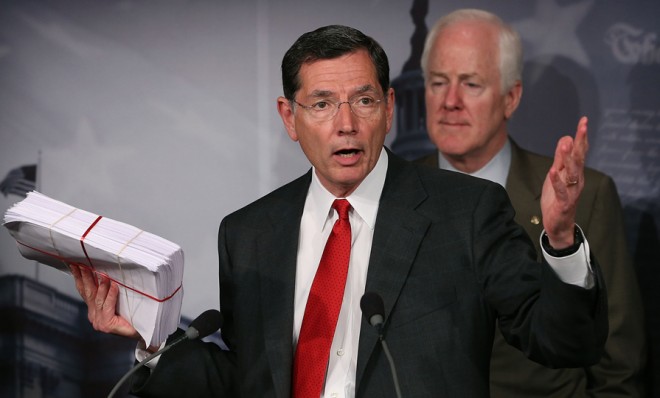The GOP's ObamaCare paradox
Republicans insist the law will be a mega-disaster. But they also seem scared that Americans will like it.


A free daily email with the biggest news stories of the day – and the best features from TheWeek.com
You are now subscribed
Your newsletter sign-up was successful
Republicans really want you to know that ObamaCare will be an unmitigated disaster. The massive package of health-care reforms will cause premiums to skyrocket, and might even collapse under its own weight when young people don't enroll, conservatives say. And yet, a contradictory fear lingers on the right: If the law is fully implemented, it will surely be here to stay.
These two things are hard to square.
Actions speak louder than words, which is why the latter argument is the one Republicans really believe. This explains the efforts to delay and defund. After all, if Republicans truly thought ObamaCare would be an instant and obvious disaster, they would insist on fully implementing it, ASAP. They could count on the horrible-ness of the law to swing public opinion to their side.
The Week
Escape your echo chamber. Get the facts behind the news, plus analysis from multiple perspectives.

Sign up for The Week's Free Newsletters
From our morning news briefing to a weekly Good News Newsletter, get the best of The Week delivered directly to your inbox.
From our morning news briefing to a weekly Good News Newsletter, get the best of The Week delivered directly to your inbox.
But what happens if and when ObamaCare is fully implemented, and it's not an absolute disaster? What if Americans actually like it? That's what Republicans really fear, and why many are furiously scrambling to delay and defund the law.
Now, this is not to say that ObamaCare won't be destructive — just that it might not immediately look that way. "The problematic part," the Washington Examiner's Justin Green recently told me, is "if they get these exchanges to work, people will probably like it. And it will have a negative trajectory for the economic wellbeing of the country, but not in a way that people will personally and immediately feel it — and not in a way that you can quickly measure."
America is a dynamic country. Our resilient economy compensates for (and perhaps even camouflages) things that are a drag. The American economy will eventually improve, and when it does, conservatives may well end up being forced to make the counterfactual argument that, "Well, yeah, but the economy would be doing even better if we didn't have ObamaCare." That's a point that might well be true, but would also be impossible to prove. It's akin to the liberal argument that the economy would have been even worse without the stimulus.
By attacking ObamaCare as a disaster waiting to happen, Republicans may be inadvertently losing the expectations game.
A free daily email with the biggest news stories of the day – and the best features from TheWeek.com
Consider a related hypothetical from the abortion debate. Many conservatives trumpet the fact that babies can feel the pain of late-term abortion. I'm entirely willing to believe this is true, and I suspect it helps win converts. But what if a study comes out tomorrow demonstrating these conservatives are wrong — that abortion is completely painless for the baby? I would still oppose abortion on principle, but I suspect putting so many chips on this claim, that is then suddenly deflated, would inadvertently help change the debate from being about the right to life to being about the right to painless death.
Something similar could happen with ObamaCare. Conservatives have been shouting for years that the law is an economy-killing, liberty-infringing monstrosity. Maybe it will be that bad on the macro, long-term level. But if the law is implemented and the apocalypse doesn't come, and some people find the law actually seems to help them — well, Republicans would have set themselves up for the fall by raising expectations so much.
So much of conservatism is about adhering to principle and being cognizant of long-term unintended consequences. This is understandably a hard sell in our modern climate of instant gratification, simplicity, and selfishness. Persuading people to understand that ObamaCare could be a short-term success and a long-term disaster is probably impossible. Republicans who want to stop it are better off making sure it is never fully implemented, and ironically, the way to do that is probably to convince the public that it will fail. But in so doing, we conservatives are also setting ourselves up for political failure.
Matt K. Lewis is a contributing editor at TheWeek.com and a senior contributor for The Daily Caller. He has written for outlets including GQ Politics, The Guardian, and Politico, and has been cited or quoted by outlets including New York Magazine, the Washington Post, and The New York Times. Matt co-hosts The DMZ on Bloggingheads.TV, and also hosts his own podcast. In 2011, Business Insider listed him as one of the 50 "Pundits You Need To Pay Attention To Between Now And The Election." And in 2012, the American Conservative Union honored Matt as their CPAC "Blogger of the Year." He currently lives in Alexandria, Va.
